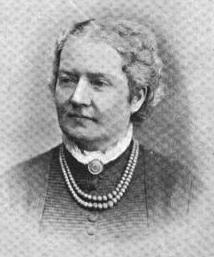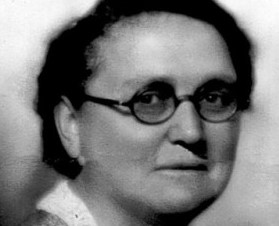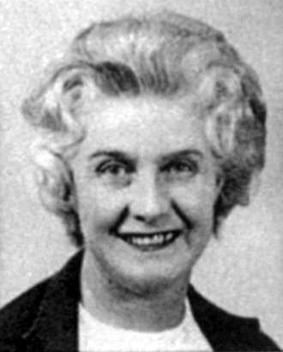Later life
During her time in Glasgow, she shared a house with Elizabeth Margaret Pace at 7 Newton Place until the latter's marriage in 1908. McLaren died in Crail in 1945. [3]

Alice Janet McLaren | |
|---|---|
| Born | 1860 Edinburgh, Scotland |
| Died | 1945 (aged 78–79) |
| Alma mater | London School of Medicine for Women |
| Occupation | Doctor |
| Years active | 1890 - |
| Known for | Medicine |
| Medical career | |
| Field | Obstetrics |
Dr Alice McLaren (1860 - 1945) was a Scottish medical doctor, gynecologist, suffragist and advocate for women's health and women's rights. She was the first woman medical practitioner in Glasgow. [1]
McLaren was born in Edinburgh to William Cunningham McLaren and Maria Amelia Wilson, and was the last of six siblings. She graduated with first class honours in Medicine from University of London in 1893. [2] [3] McLaren trained at Glasgow Royal Infirmary.
The British Medical Journal's obituary of McLaren noted that she was the first woman gynecologist in Glasgow. [3] During her career, she worked in a number of institutions, including:
McLaren was a fellow of the Glasgow Obstetrical and Gynecological Society. [4] In 1902, she was involved in founding the Glasgow Women's Private Hospital alongside Elizabeth Margaret Pace. [5]
During her time in Glasgow, she shared a house with Elizabeth Margaret Pace at 7 Newton Place until the latter's marriage in 1908. McLaren died in Crail in 1945. [3]

McLaren was a founder member of the Glasgow and West of Scotland Association for Women's Suffrage. [6]

Eliza Maud "Elsie" Inglis was a Scottish medical doctor, surgeon, teacher, suffragist, and founder of the Scottish Women's Hospitals. She was the first woman to hold the Serbian Order of the White Eagle.

Louisa Stevenson was a Scottish campaigner for women's university education, women's suffrage and effective, well-organised nursing. She was the co-founder of Edinburgh’s Queen Margaret University.

Agnes McLaren FRCPI was a Scottish doctor who was one of the first to give medical assistance to women in India who, because of custom, were unable to access medical help from male doctors. Agnes was active in social justice causes including protests against the white slave trade. She signed the 1866 women's suffrage petition and was secretary of the Edinburgh National Society for Women's Suffrage alongside her stepmother, Priscilla Bright McLaren. In 1873 she travelled with Priscilla and Jane Taylour to give suffrage lectures in Orkney and Shetland. Her father had supported the campaign of first women who sought to study medicine at University of Edinburgh and Agnes became friends with Sophia Jex-Blake, one of the Edinburgh Seven. Her father did not however, support Agnes' own ambitions in this area. And as she could not graduate in medicine in Scotland, she went to study in France and later, in order to be permitted to practice at home, became a member of the Royal College of Dublin.

Marion Gilchrist was the first female graduate of the University of Glasgow, one of the first two women to qualify in medicine from a Scottish university; and a leading activist in the Women's suffrage Movement in Scotland. In recognition of her achievements she has been honoured in a number of ways.

The Scottish Women's Hospitals for Foreign Services (SWH) was founded in 1914. It was led by Dr Elsie Inglis and provided nurses, doctors, ambulance drivers, cooks and orderlies. By the end of World War I, 14 medical units had been outfitted and sent to serve in Corsica, France, Malta, Romania, Russia, Salonika and Serbia.

Wilhelmina Hay Abbott, also known by the name "Elizabeth Abbott," was a Scottish suffragist, editor, and feminist lecturer, and wife of author George Frederick Abbott.

Alexandra Mary Chalmers Watson CBE,, known as Mona Chalmers Watson, was a British physician and head of the Women's Army Auxiliary Corps. The first woman to receive an MD from the University of Edinburgh, she helped found the Elsie Inglis Hospital for Women, was the first president of the Edinburgh Women's Citizen Association, a staff physician and later senior physician at the Edinburgh Hospital and Dispensary for Women and Children, and co-edited the Encyclopaedia Medica with her husband, Douglas Chalmers Watson. At the time of her death in 1936, she was president of the Medical Women's Federation, having been elected May 1935.

Eliza Wigham, born Elizabeth Wigham, was a Scottish campaigner for women's suffrage, anti-slavery, peace and temperance in Edinburgh, Scotland. She was involved in several major campaigns to improve women's rights in 19th-century Britain, and has been noted as one of the leading citizens of Edinburgh. Her stepmother, Jane Smeal, was a leading activist in Glasgow and together they made the Edinburgh Ladies' Emancipation Society. Her brother John Richardson Wigham was a prominent lighthouse engineer.

Priscilla Bright McLaren was an English activist who served and linked the anti-slavery movement with the women's suffrage movement in the nineteenth century. She was a member of the Edinburgh Ladies' Emancipation Society and, after serving on the committee, became the president of the Edinburgh Women's Suffrage Society.
The Edinburgh National Society for Women's Suffrage was a leading group for women's rights in Scotland. It was one of the first three suffrage societies to be formed in Britain.

Mabel Lieda Ramsay was a British medical doctor and suffragist, based in Plymouth. She was the third woman to become a fellow of the Royal College of Surgeons of Edinburgh and the first woman to be president of the Plymouth Medical Society. She was decorated for her work with the Women's Imperial Service as a doctor in Belgium and France during World War I.
Alice Stewart Ker or Alice Jane Shannan KerMRCPI was a Scottish physician, health educator, and suffragette. She was the 13th woman on the registry of the British Medical Association.

The Glasgow and West of Scotland Association for Women’s Suffrage was an organisation involved in campaigning for women’s suffrage, based in Glasgow, with members from all over the west of Scotland.

Jane E. Taylour was a Scottish suffragist and women's movement campaigner, and one of the first women to give lectures in public. She travelled around Scotland and northern England as a suffrage lecturer, and was a key figure in spreading the message of the women's suffrage throughout Scotland and inspiring others to join the National Society for Women's Suffrage.

Maud Perry Menzies O.St.J. was a Scottish physician who specialised in community medicine. She introduced significant improvements to public health care in Glasgow.
Margaret Williamson Menzies Campbell FDS FRCSE was a Scottish surgeon and general practitioner, who is known for her work as an historian of women's medical education and practice and dentistry.

Dr Elizabeth Pace was a Scottish medical doctor, suffragist and advocate for women's health and women's rights.

Frances Mary McPhun (1880–1940) was a Scottish suffragette who served two months in Holloway prison, and had organised events and processions for women's suffrage in Edinburgh.

The Lock Hospital for Women was a hospital in Glasgow for women suffering from venereal disease.